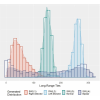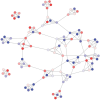I am a postdoctoral researcher of the COALESCE Lab at the Autonomous University of Barcelona and involved in the European Research Council (ERC) Advanced Grant project PATCHWORK – A Network Science Approach to Social Cohesion in European Societies. Before joining the lab, I earned my Ph.D. degree in sociology from Cornell University in 2022. Using agent-based modeling and suggesting new network measures, I study what network structural features can lead to social cohesion or conflict (e.g., political/cultural polarization; openness to interracial friendships; power dynamics between directors and actors). My studies are also largely rooted in the theoretical traditions of social exchange, social capital, relational sociology, and analytical sociology.
More specifically, I have three lines of research.
- Agent-based models (ABMs) with empirically oriented network parameters: Many existing ABMs often simplify the network structure using stylized network models only (e.g., small-world), overlooking empirically observed conditions, such as network segregation by race/class and certain distributional features of ties (e.g., right-skewness). My studies suggest formal ABM parameters to consider those network structural features in a customizable way and show how they shape the emergence of cultural/opinion polarization.
- Network measures of social exchange theories: Social exchange theories argue that certain exchange network conditions (e.g., equal power-dependence relations; shorter distance of chain-generalized exchange) can lead the actors to experience cohesion-related psychological consequences, such as trust and positive emotion toward a group or society. Yet, no formal measures for social network analysis are suggested. Using a graph-theoretic formalization and simulation approach, my studies suggest new network measures for social exchange theories and reveal original findings, including complicated power-dependence relationships between directors and actors and how adolescents’ experience of equal and mutual power-dependence in school networks can lead to their openness to interracial friendships in adulthood.
- Social networks and cohesion in European societies: Our PATCHWORK project data have valuable ego-centric social network data from four European countries that show various types of ties (e.g., core, acquaintance relationships, negative ties) with detailed information about ego and alters (e.g., age, gender, race, occupation, religion, and political views). Co-working with COALESCE lab members, I plan to explore the relationship between social networks and cohesion by applying the network graphs estimated from the data to my in-progress agent-based models inspired by Bourdieu’s concept of distinction and Collins’ theory of interaction ritual chains.
Two of my dissertation chapters received the Best Graduate Student Paper Award of the Decision-Making, Social Networks, and Society Section (Formerly, Rationality and Society) of the American Sociological Association (ASA) and the Robert McGinnis Best Paper Award from the Department of Sociology at Cornell University in 2022.
As for teaching, I was actively engaged in teaching undergraduates during my time at Cornell University and selected as the winner of the Outstanding Teaching Assistant Award from the Department of Sociology in 2019. I am also currently leading biweekly reading group meetings in the COALESCE Lab (see the link here).
My papers have been published in Social Networks and the Journal of Mathematical Sociology.
You can find my CV here.


